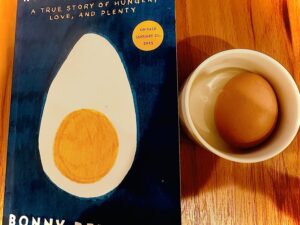Machine Without Horses (a Scottish country dance) from noted Canadian author Helen Humphreys sounded odd when I read the description: “In Machine Without Horses, Helen Humphreys explores the real life and the imagined internal life of the famous and famously private salmon-fly dresser, Megan Boyd, a craftswoman who worked for sixty years out of a bare-bones cottage in a small village in the north of Scotland. Humphreys, both present in the story and its architect reveals with her inimitable style the complicated emotional landscape that can exist under even the most constant surface.” Salmon fishing is not my forte, and I never expected to like the book. Once I started reading it though, I could not put it down.
It was so unique in its approach. The first half of the book is told from the author’s perspective as she tries to create a story about Megan Boyd’s life when little or no information exists. It takes the reader through the process of her writing from trying to learn how to dress a salmon fly to imagining what Boyd’s life was like. She struggles to capture what her life may have been like and she tries telling her story from a number of different angles before she is satisfied that she can tell her story in a way that will touch the reader. Her hope is that the reader will see Boyd not just as an oddity, but “a fully realized human being.”
The second half of the book concentrates on her subject’s story, although her name has been changed to Ruth to avoid upsetting her friends and relatives. Ruth is eccentric, but kind; lonely, but easily overwhelmed by visitors. She is an anomaly in her small village, shunning the basics that would make her life easier, like electricity, but still finding her own way to fit in. It is in this section of the book that Ruth/Megan really comes alive as a character, although it is a little disappointing to have the author disappear completely from the story. It would have been a great pay-off to have, at the very least, an Epilogue to complete her tale. The story of Ruth, though, is at times amusing, but also heart-breaking. It succeeds in making a simple life more rich and robust.
It is a beautifully told story from start to finish and one of the most surprising books of the year. It is surprising, not because of any typical suspense tactics, but because it is a small story told in a nuanced way that leaves the reader both wanting more, but also satisfied with the way that it ends.









